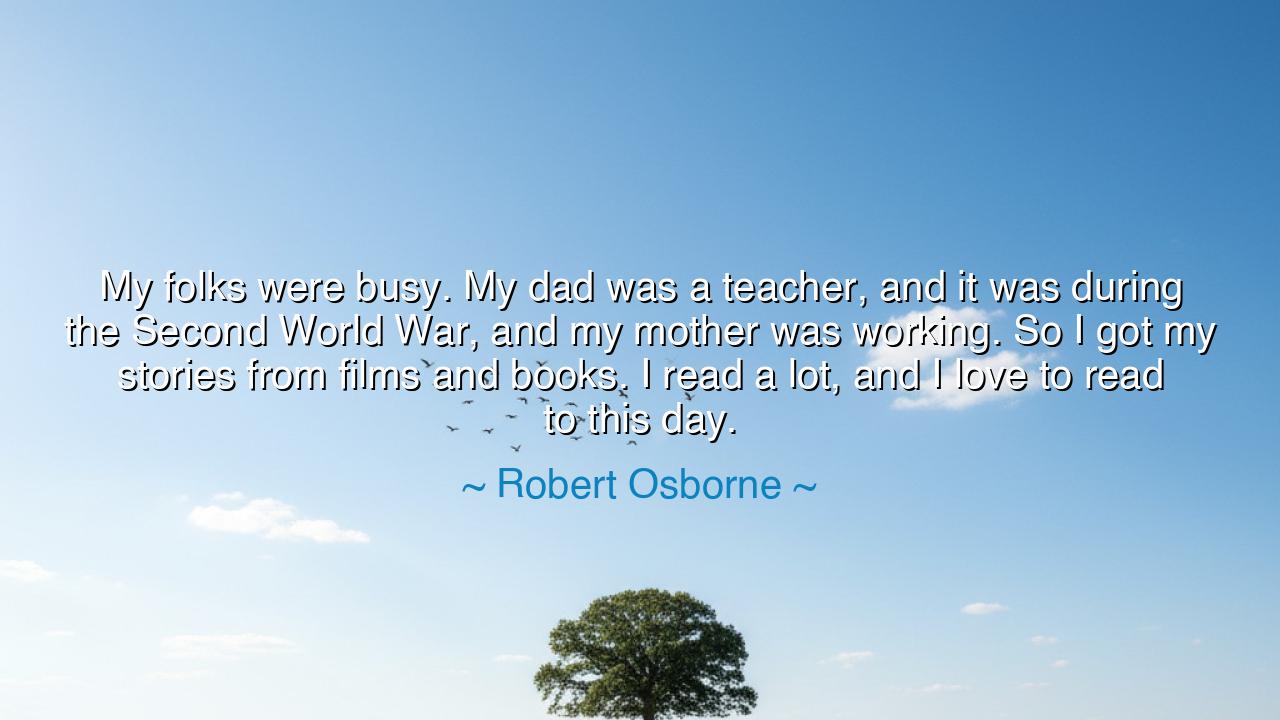
My folks were busy. My dad was a teacher, and it was during the
My folks were busy. My dad was a teacher, and it was during the Second World War, and my mother was working. So I got my stories from films and books. I read a lot, and I love to read to this day.






Hear the voice of Robert Osborne, chronicler of cinema, who once said: “My folks were busy. My dad was a teacher, and it was during the Second World War, and my mother was working. So I got my stories from films and books. I read a lot, and I love to read to this day.” In this quiet recollection there shines a truth that is both intimate and universal: that when the world is burdened, and when parents must labor in duty and sacrifice, the imagination of the young seeks refuge in stories—and from those stories springs both comfort and destiny.
The meaning of Osborne’s words lies in the power of books and films to serve as companions, teachers, and guides. In a world disrupted by war, where families were scattered and homes were burdened by responsibility, the child’s heart might have grown lonely or silent. Yet, in the absence of constant parental attention, the young Robert found another source of nurture: the voices of storytellers across the ages, preserved in the pages of literature and the glowing light of the cinema. These became his mentors, his friends, his treasure trove of wonder.
History abounds with similar tales. Consider Abraham Lincoln, who as a boy in poverty had few possessions, but treasured every book he could borrow. By the firelight he devoured stories, speeches, and scripture, and these tales shaped his mind into that of a leader. Like Osborne, Lincoln discovered that reading was not only escape but transformation—the shaping of thought, the broadening of horizons, the deepening of empathy. Where human teachers were scarce, the written word became his school.
Osborne’s mention of the Second World War also carries weight, for it was a time when millions of children grew up in households strained by sacrifice. Fathers were sent to the front, mothers took up the labors of factories and offices, and children learned resilience in the face of absence. For many, it was stories—tales of courage, myth, adventure, and love—that kept alive the sense of hope. Whether in the laughter of a film comedy or the nobility of an epic novel, these works gave light when the world seemed dark. Osborne, in remembering his love for stories, speaks for an entire generation.
The deeper wisdom here is that while war and hardship may take much from us, the imagination remains unbroken. Even when life is heavy with labor and responsibility, the mind can soar through the words of a book or the flickering scenes of a film. This is why Osborne “loves to read to this day”—because he learned early that stories are not luxuries, but sustenance, a way of enduring loneliness, of making sense of chaos, of connecting to something greater than oneself.
The lesson is clear: do not underestimate the power of stories. They are not mere diversions, but companions in times of trial and teachers in times of growth. If you are lonely, let the voices of storytellers keep you company. If you are weary, let the tales of courage rekindle your strength. And if you are a parent, a teacher, or a guide, remember that while your hands may be bound by duty, the gift of books and films can nourish the spirit of those in your care.
Practical actions follow: make time each day for reading, not only for knowledge, but for joy. Choose stories that uplift and inspire. Share books with children, for in giving them stories, you give them worlds. Remember also that films, when chosen wisely, can shape imagination and empathy as deeply as the written word. Like Osborne, cultivate a lifelong love of stories, and you will never walk alone, for the voices of countless storytellers will walk with you.
Remember always: even in times of absence, even in times of hardship, stories sustain the soul. They are the guardians of memory, the teachers of imagination, and the sparks of hope. Osborne’s words are not only a personal recollection, but a testimony to the enduring truth that those who read, and those who listen, are never truly poor, nor ever truly alone.






AAdministratorAdministrator
Welcome, honored guests. Please leave a comment, we will respond soon